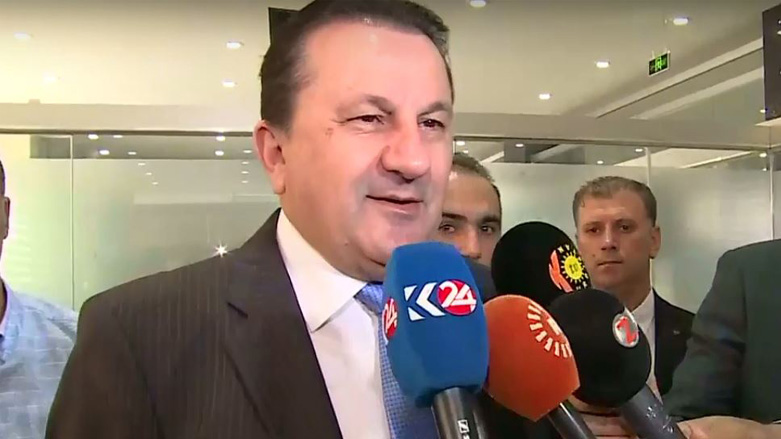Iraq can't deny rights of Kurds in disputed territories: KDP official

ERBIL (Kurdistan 24) – Khasro Goran, a member of the Kurdistan Democratic Party’s (KDP) Leadership Council, reaffirmed on Wednesday the importance of Iraq’s disputed territories to the Kurds’ cause and hoped for political unity among Kurdish parties on the issue.
The interview came after Goran, also Head of KDP’s Electoral Establishment, went to the Kurdistan Region’s Independent High Elections and Referendum Commission (IHERC) office to register his party for the Kurdistan Region’s Sep. 30 elections.
Regarding his party’s position on the IHERC’s decision to use manual voting instead of the national election’s electronic voting system, he said: “We are neutral in that matter. Whichever [system] the commissions of Iraq and Kurdistan approve, we will comply with them.”
Goran pointed out that his party has 100 candidates running in the upcoming election.
Regarding the May 12 Iraqi parliamentary elections, Goran reiterated his party’s readiness to follow a manual ballot recount procedure, requested by various political entities alleging fraud.
“Whatever decisions the commission [Independent High Electoral Commission (IHEC)] makes, if they [the parties alleging fraud] doubt a voting center and want a manual recount there, then we support them,” he said, restating earlier statements by the KDP that seek greater unity among Kurdish parties.
“We would like for Kurds to go to Baghdad as a single entity far from partisanship and narrow self-interests. Our [the Kurds’] job will be to represent the desires of the people of Kurdistan and the people in the disputed territories,” Goran said, reaffirming the wishes of many Kurdish parties.
The question of the fate of the differences over territories disputed by Iraq's federal government and the Kurdistan Regional Government (KRG) are addressed in Article 140 of the Iraqi Constitution, which to the irritation of the Kurds is yet to be implemented after a decade-long wait.
The article settles the future of the territories through a referendum by the local population deciding whether their region should become part of the KRG or remain under the administration of the Iraqi government.
Goran also set it a strong precondition for the future of coalition formation with other Kurdish parties by expressing that the KDP will be ready to work with anyone “as long as they stick to representing the voice of the Kurds as our main objective.”

“Those regions are critical to us,” Goran said, commenting on Secretary-General of the Peshmerga Ministry Jabar Yawar’s recent declaration of the return of Kurdish Peshmerga fighters to disputed territories as a strong condition of Kurdish parties in ongoing post-election negotiations.
Iran-backed Hashd al-Shaabi militias pushed Kurdish forces from oil-rich Kirkuk and other disputed areas last October. The military campaign was Baghdad’s response to the Kurdistan Region’s independence referendum held shortly before which received extensive support for secession.
“After the fall of Saddam Hussein in 2003, those regions were ruled by a coalition of Kurdish, Iraqi, and at times US fighters and it has to return to this state until the fate of those territories is decided,” Goran said.
“They can’t deny the rights of the Kurds in those regions,” he concluded, referring to the Iraqi government.
Editing by Karzan Sulaivany
